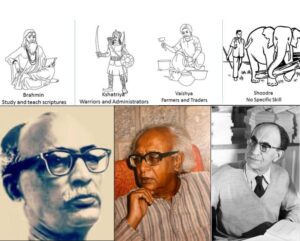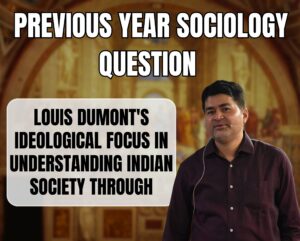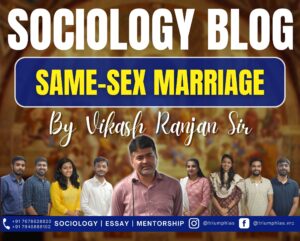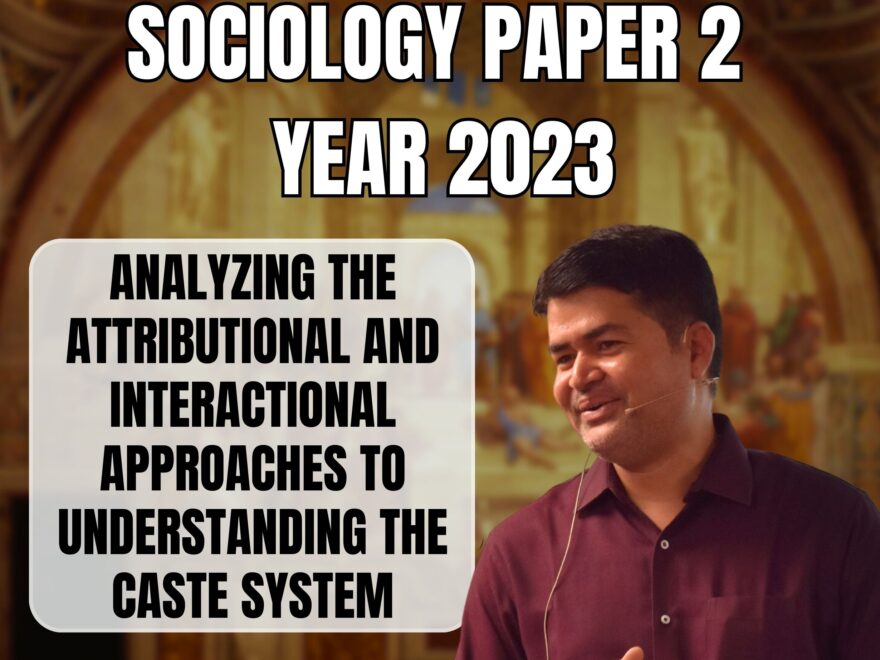Analyse the differences between the attributional and interactional approach in studying the caste system.
Section: A
Sociology Paper 2023 Analysis
(Paper 2: Unit-12 Social Structure; Caste System)

Question: 1 (c) Analyse the differences between the attributional and interactional approach in studying the caste system.
(10 Marks)
|
Introduction: Brief Introduction About Caste as Unique Social Reality and Two Different Approaches Studying Caste Main Body: Detailed Analysis of Attributional and Interactional Approach Highlighting Difference in Both by Using Ideas of Various Sociologists Conclusion: On the Lines that Caste is Dynamic Reality of Indian Society to be Understood with Different Approaches to get Better Understanding |
Introduction:
- India’s caste system is among the world’s oldest forms of surviving social stratification. Caste is considered as both, a cultural and structural phenomenon. Caste is also viewed from two broad perspectives; attributional and interactional perspectives.
- Attributes are considered as inherent inalienable qualities associated with the caste system. For example, Bougle, Ghurye And Louis Dumont used this perspective to focus on three key features of caste.
- Interactional approach takes into account how castes are actually ranked with respect to one another in a local empirical context. Though it also mentions attributes, but its prime focus is on interactions. Beteille is one such sociologist who subscribed to this view.
Main body:
- Attributional approach discusses primarily the significant features of the caste system qua system and what distinguishes it from other forms of the social stratification. Interaction approach takes into account how castes are actually ranked with respect to one another in a local empirical context.
- The attributional approach, characterized by scholars like S. Ghurye and M.N. Srinivas, concentrates on inherent caste attributes such as hierarchy, endogamy, and traditional occupations, seeking to define caste based on these characteristics, while the interactional approach, exemplified by F.G. Bailey and L. Dumont, explores actual caste relationships within specific contexts like commensality and food types, emphasizing the role of rituals and religious values in determining caste hierarchy.
- For example Bailey feels that caste dynamics and identity are united by the two principles of segregation and hierarchy. He feels that ‘“Castes Stand in ritual and secular hierarchy expressed in the rules of interaction”. The ritual system overlaps the political and economic system.
- According to interactional approach the relationship between castes does not comprise rituals alone –there is a power dimension because there exists a dominant caste to which other castes are subordinate. Rank and caste identity are expressed by a lower caste attempting to emulate a caste which is higher in rank. Thus the interaction pattern becomes indicative of ritual status the rank order hierarchy.
- Scholars using the attributional approach stress the attributes of a caste. However each of them lays emphasis on one or other of these attributes and how they affect interaction. In the case of Srinivas he chooses to study the structure of relations arising between castes on the basis of these attributes. Thus he introduces a dynamic aspect of caste identity very forcefully. This aspect becomes clearer in Srinivas’s work on positional mobility known as ‘Sanskritization’
- Attributes can explain caste with reference to the relationship between castes. For example Hutton held that the central feature of the caste system was endogamy which is centred on the relationship restrictions of caste .Around this fact are built up the various restrictions and taboos According to Dumont‘s interactional approach the local context has a role in caste ranking and identity, but this is a response to the ideology of hierarchy which extends over the entire caste system. Thus according to interactional approach caste is a set of relationship of economic, political and kinship systems, sustained by mainly religious values.
- The attributional approach aims to preserve caste identity through the maintenance of attributes like caste pollution and endogamy, whereas the interactional approach highlights consensus within local contexts and the overlap of economic, political, and ritual hierarchies in shaping caste ranking.
Conclusion:
The attributional approach centers on inherent caste attributes and the preservation of caste identity, whereas the interactional approach examines caste interactions in specific contexts, highlighting the significance of rituals, religious values, and consensus in shaping caste hierarchy. Both approaches aim to elucidate the intricate nature of the caste system in Indian society, recognizing its diversity, and collectively contribute to broadening our understanding of this age-old social reality.
Related Blogs…
 |
 |

To master these intricacies and fare well in the Sociology Optional Syllabus, aspiring sociologists might benefit from guidance by the Best Sociology Optional Teacher and participation in the Best Sociology Optional Coaching. These avenues provide comprehensive assistance, ensuring a solid understanding of sociology’s diverse methodologies and techniques.
META TAGS:
Caste system, Attributional approach, Interactional approach, Caste system in India, Ghurye, Srinivas, Bailey, Dumont, Caste hierarchy, Rituals, Religious values, Indian society, Social stratification, Caste identity,
Why Vikash Ranjan’s Classes for Sociology?
Proper guidance and assistance are required to learn the skill of interlinking current happenings with the conventional topics. VIKASH RANJAN SIR at TRIUMPH IAS guides students according to the Recent Trends of UPSC, making him the Best Sociology Teacher for Sociology Optional UPSC.
At Triumph IAS, the Best Sociology Optional Coaching platform, we not only provide the best study material and applied classes for Sociology for IAS but also conduct regular assignments and class tests to assess candidates’ writing skills and understanding of the subject.
Choose The Best Sociology Optional Teacher for IAS Preparation?
At the beginning of the journey for Civil Services Examination preparation, many students face a pivotal decision – selecting their optional subject. Questions such as “which optional subject is the best?” and “which optional subject is the most scoring?” frequently come to mind. Choosing the right optional subject, like choosing the best sociology optional teacher, is a subjective yet vital step that requires a thoughtful decision based on facts. A misstep in this crucial decision can indeed prove disastrous.
Ever since the exam pattern was revamped in 2013, the UPSC has eliminated the need for a second optional subject. Now, candidates have to choose only one optional subject for the UPSC Mains, which has two papers of 250 marks each. One of the compelling choices for many has been the sociology optional. However, it’s strongly advised to decide on your optional subject for mains well ahead of time to get sufficient time to complete the syllabus. After all, most students score similarly in General Studies Papers; it’s the score in the optional subject & essay that contributes significantly to the final selection.
“A sound strategy does not rely solely on the popular
Opinion of toppers or famous YouTubers cum teachers.”
It requires understanding one’s ability, interest, and the relevance of the subject, not just for the exam but also for life in general. Hence, when selecting the best sociology teacher, one must consider the usefulness of sociology optional coaching in General Studies, Essay, and Personality Test.
The choice of the optional subject should be based on objective criteria, such as the nature, scope, and size of the syllabus, uniformity and stability in the question pattern, relevance of the syllabic content in daily life in society, and the availability of study material and guidance. For example, choosing the best sociology optional coaching can ensure access to top-quality study materials and experienced teachers. Always remember, the approach of the UPSC optional subject differs from your academic studies of subjects. Therefore, before settling for sociology optional, you need to analyze the syllabus, previous years’ pattern, subject requirements (be it ideal, visionary, numerical, conceptual theoretical), and your comfort level with the subject.
This decision marks a critical point in your UPSC – CSE journey, potentially determining your success in a career in IAS/Civil Services. Therefore, it’s crucial to choose wisely, whether it’s the optional subject or the best sociology optional teacher. Always base your decision on accurate facts, and never let your emotional biases guide your choices. After all, the search for the best sociology optional coaching is about finding the perfect fit for your unique academic needs and aspirations.
Follow us :
🔎 https://www.instagram.com/triumphias
🔎https://www.youtube.com/c/TriumphIAS
🔎https://t.me/VikashRanjanSociology
Find More Blogs…
| Compare and contrast Karl Marx’s and Max weber’s | Karl Marx- Historical Materialism |
| Talcott Parsons : Social system | Scope of the subject and comparison with other social sciences |




One comment